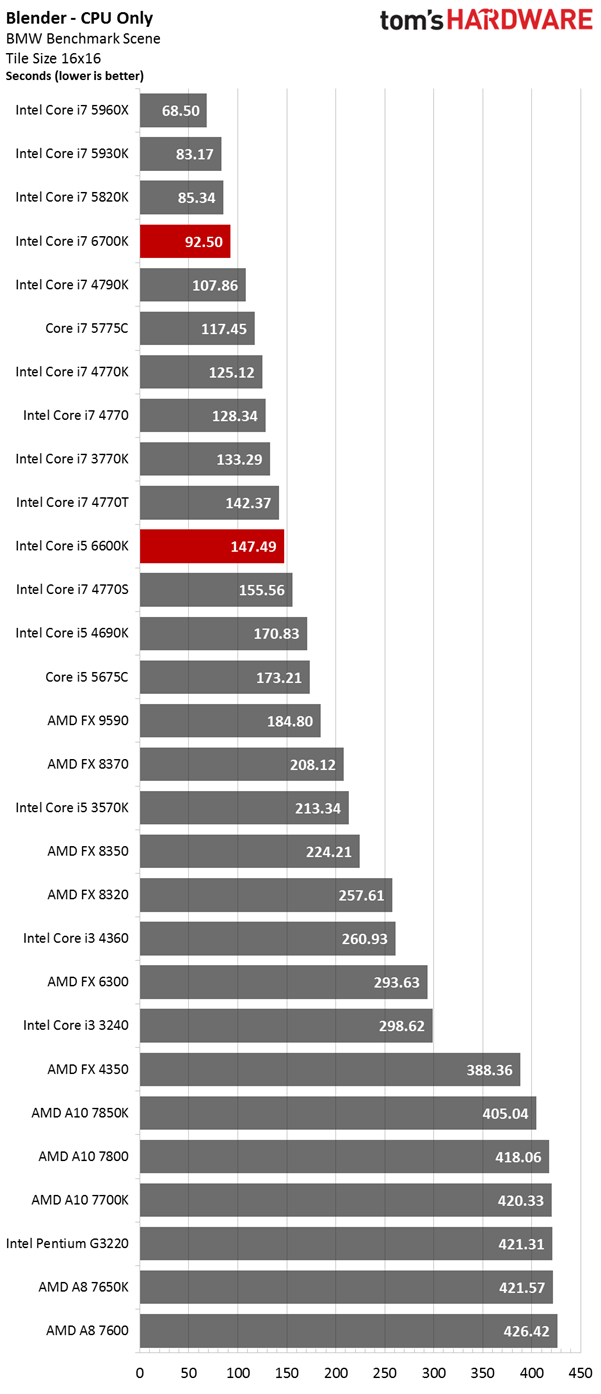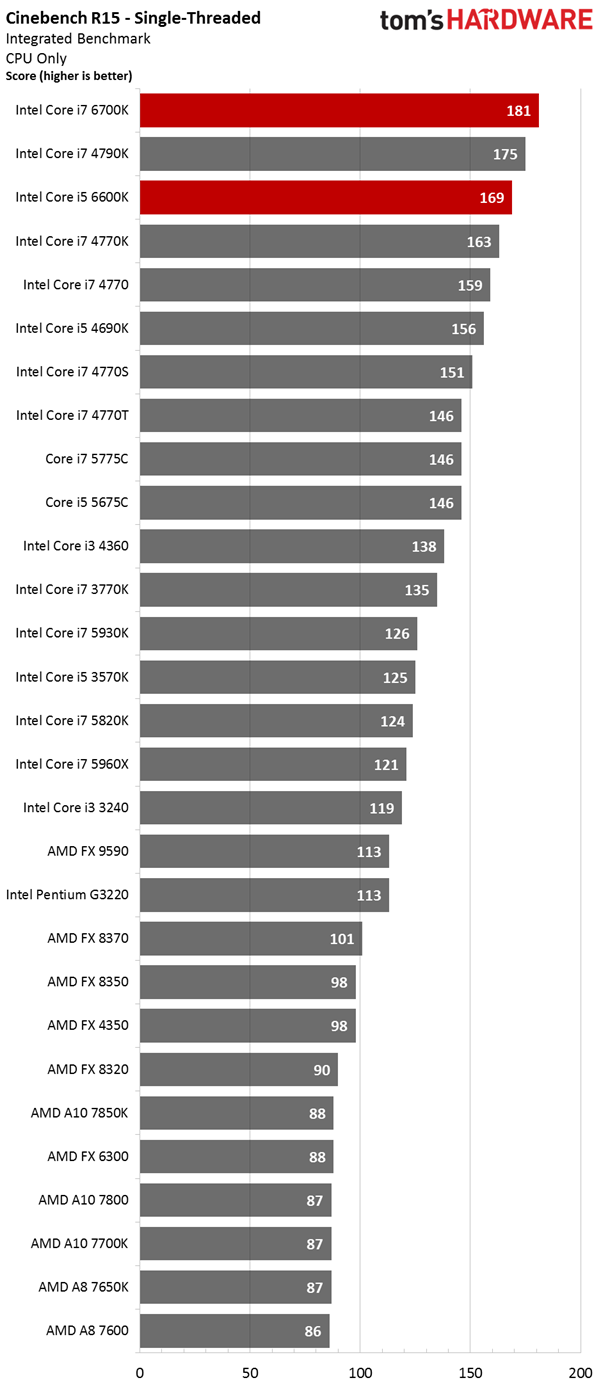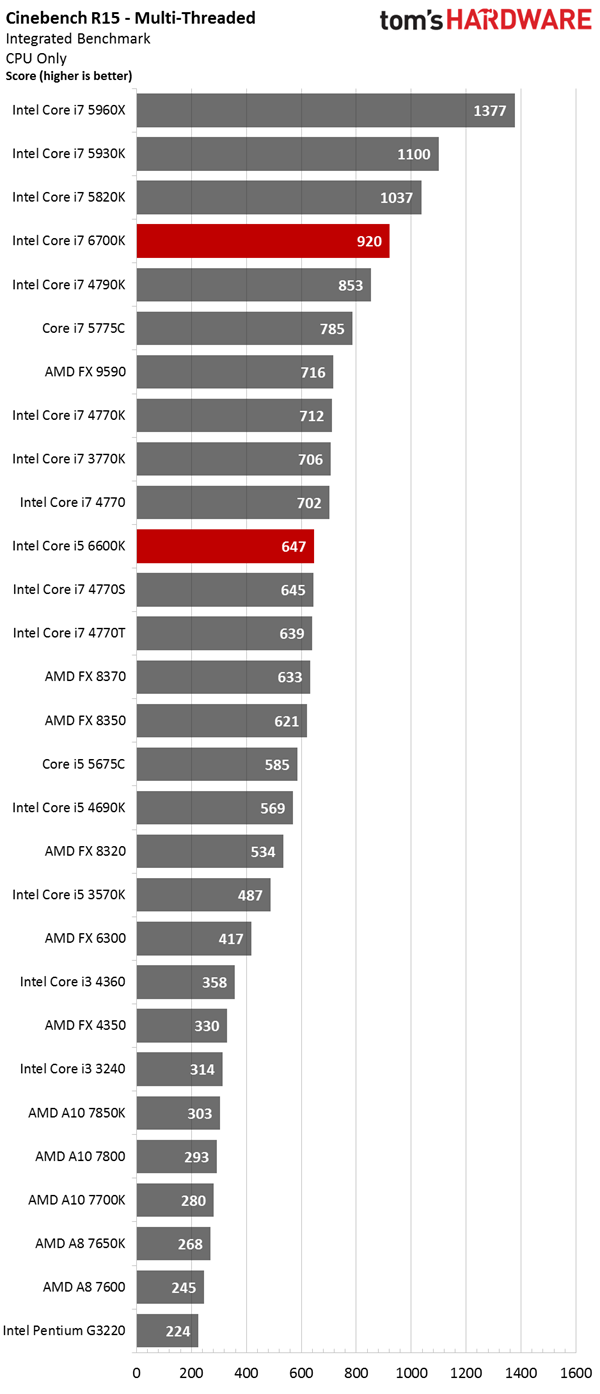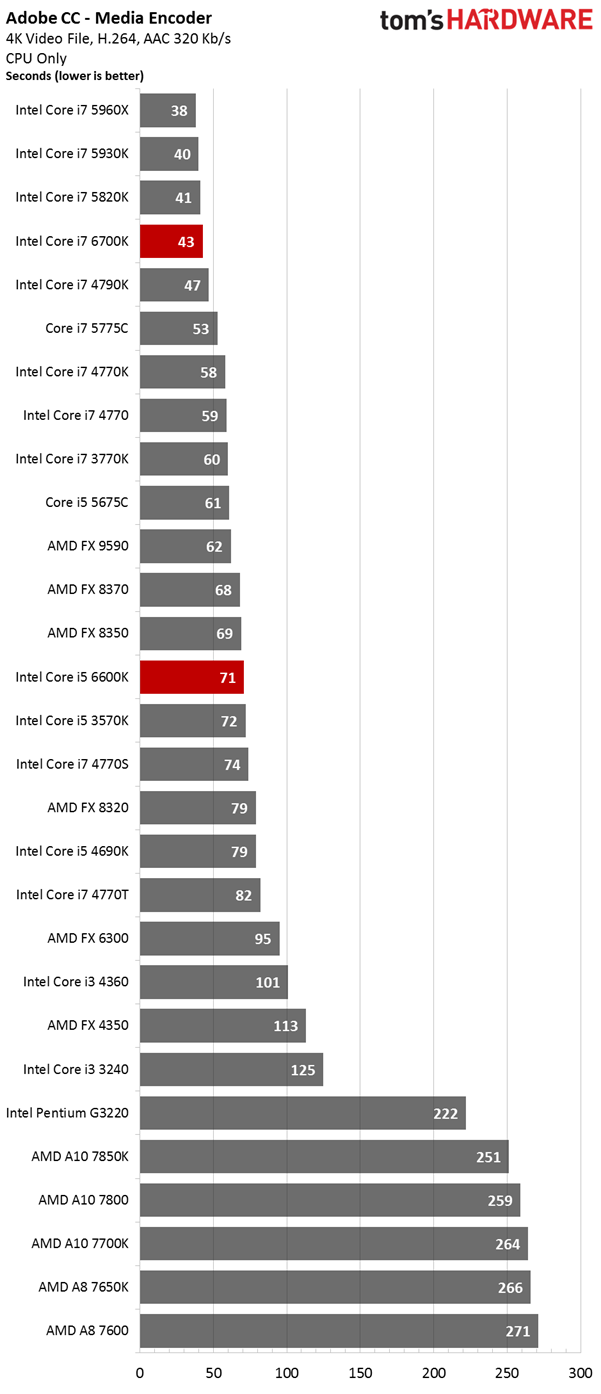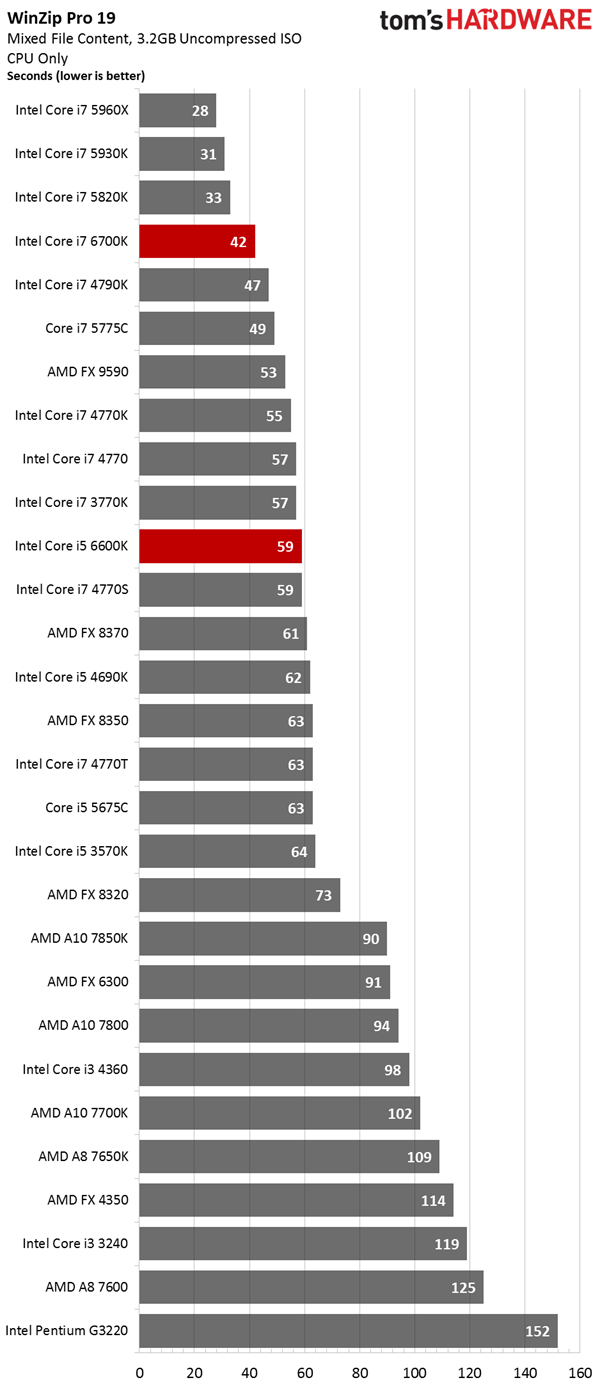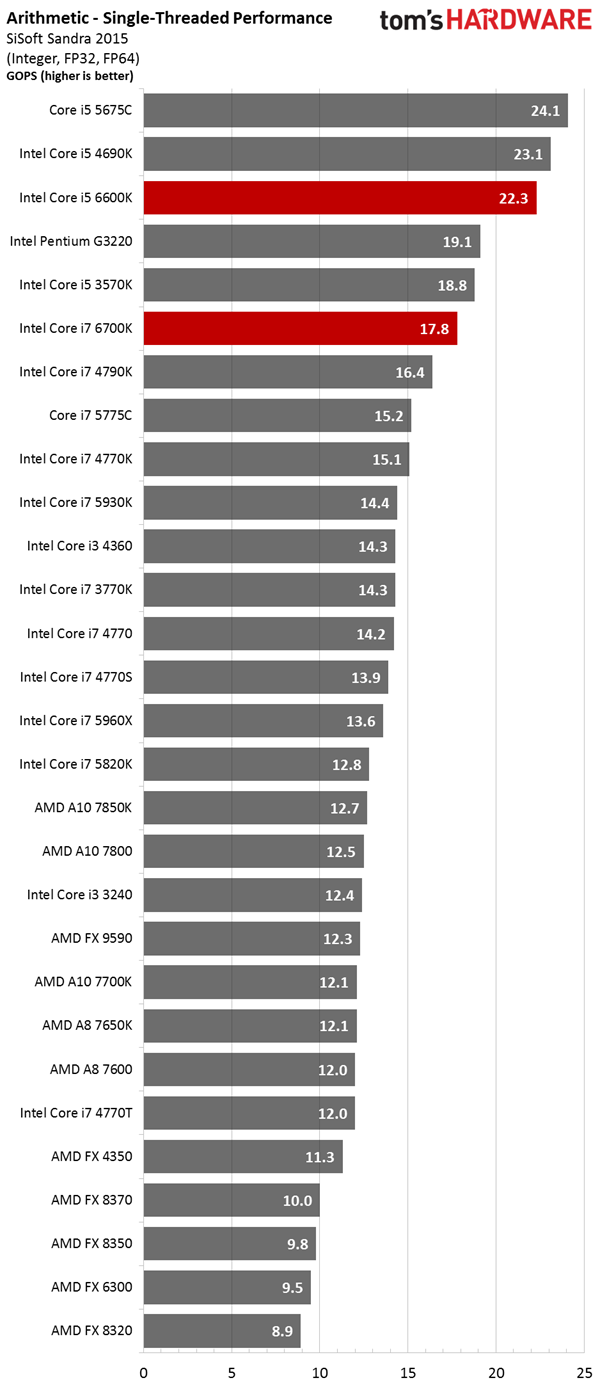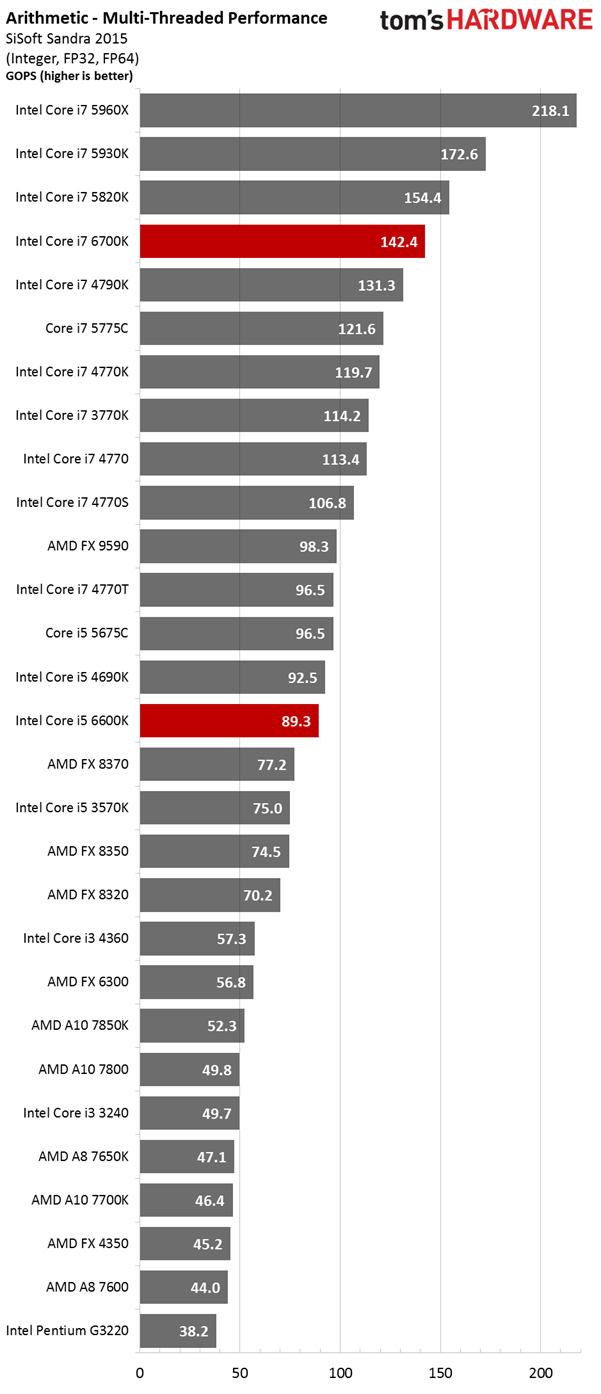Skylake: Intel's Core i7-6700K And i5-6600K
Intel gave us an early look at the Core i7-6700K, i5-6600K and Z170 chipset two weeks ahead of IDF and the unveiling of Skylake's architectural details.
Results: Rendering, Encoding, Compression, Arithmetic
Blender (Rendering)
Blender has an efficient rendering module that runs exclusively on the CPU, even though rendering our benchmark file using GPU acceleration is much faster. A tile size of 16 pixels has proven to be the most efficient for host processors, so that's what we’re using. Both Skylake-based processors fall in line as expected.
Cinebench R15 (Rendering)
This benchmark, which is based on Maxon’s Cinema 4D, provides the interesting option to have the CPU render in single- or multi-threaded mode. The ratio between the two says a lot about efficiency, illustrating the difference between physical cores and simultaneous multi-threading implementations.
This relationship between single- and multi-threaded performance is of particular interest. And we come up with one very interesting result: Intel’s Core i5-6600K falls right between the i7-4790K and i7-4770K.
Adobe CC Media Encoder (Encoding)
We’re testing with a video file saved as H.264 with 3840x2160 resolution, 25 FPS, progressive VBR, one pass, 6000 Mb/s target and 8000 Mb/s maximum. It has a 320 Kb/s and 48kHz AAC stereo soundtrack. We’re using the integrated software renderer, which makes optimal use of all possible threads. The results aren’t really surprising, though it's interesting that the Core i7-6700K approaches Intel's six-core -5820K.
WinZip Pro 19 (Compression)
The trick with this benchmark is to compress different types of content, such as text, pictures, multimedia files, videos and applications, without producing troublesome overhead due to time-sensitive file operations. This is why we copy all 3.02GB worth of data to an ISO file that can be compressed in one go. We’re using the CPU, purposely circumventing GPU acceleration via OpenCL.
SiSoft Sandra 2015 (Arithmetic)
If you compare the overall results for single- and multi-threaded performance, putting heavy emphasis on integer and 32/64-bit floating-point throughput, then Intel’s new Core i7-6700K makes quick work of the older i7-4790K, whereas the i5-6600K is found just below the i5-4690K.
If you're only looking at single-threaded performance, the SMT-equipped processors fare significantly worse, since their eight threads are scheduled through four physical cores. Even though Broadwell wins the day and the older Core i5-4690K edges out the i5-6600K, at least the i7-6700K dominates its predecessor.
Get Tom's Hardware's best news and in-depth reviews, straight to your inbox.
Current page: Results: Rendering, Encoding, Compression, Arithmetic
Prev Page Results: Office Productivity Next Page Results: Workstation Applications
Igor Wallossek wrote a wide variety of hardware articles for Tom's Hardware, with a strong focus on technical analysis and in-depth reviews. His contributions have spanned a broad spectrum of PC components, including GPUs, CPUs, workstations, and PC builds. His insightful articles provide readers with detailed knowledge to make informed decisions in the ever-evolving tech landscape
-
rantoc Yawn... its easy to see that intel have to little competition, they have stagnated in the cpu performance department!Reply -
Vlad Rose What the heck Intel? So, you provide great integrated graphics into Broadwell, then nerf it for Skylake? I guess you had to find a way to help sell your 'paper launch' of Broadwell. I really hope Xen makes you guys wake up; although it more than likely won't.Reply -
Bartendalot At least Skylake HEDT should be powerful. Unless DX12 pulls a rabbit out of a hat, this doesn't look promising for anyone who has Sandy or higher.Reply -
stairmand ReplyStill 4 cores.... Im sticking to my Q6600.
Then you really are missing out, 4 cores or not a current i5 (let alone an i7) will simply destroy the old Q6600 C2Q. It was great in the day but it's very old hat now and the lack of features on the board worse still. -
salgado18 ReplyStill 4 cores.... Im sticking to my Q6600.
You do know that your Q6600 is astronomically slower than Skylake in every single department, right? By your logic, the Phenom II X6 is better than the i7 6700K.
I think you should consider upgrading. You won't regret, promise. -
salgado18 ReplyWhat the heck Intel? So, you provide great integrated graphics into Broadwell, then nerf it for Skylake? I guess you had to find a way to help sell your 'paper launch' of Broadwell. I really hope Xen makes you guys wake up; although it more than likely won't.
Do you mean Shen, from LoL? Or Zen? XD
I believe the cost of the integrated memory chips would make these processors too expensive and niche to be viable products.
-
Lmah Good upgrade for 1st Gen i5/i7 users. Though I think they targeted it at the 2nd Gen i5/i7 users, doesn't seem like a huge improvement for them though.Reply
